Ernest Ackroyd - Extracts from his memories of Batford, 1904-1914
Taken from Ernest Ackroyd's Scrapbook in LHS Archives
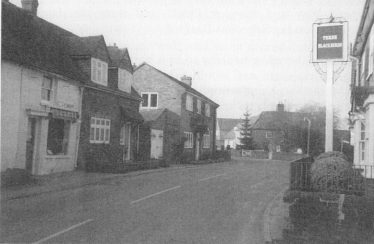
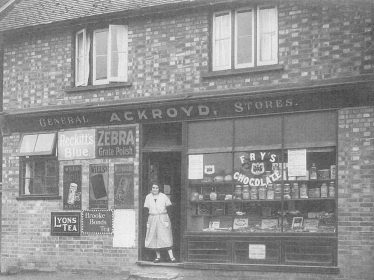

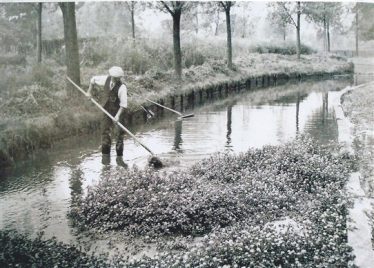
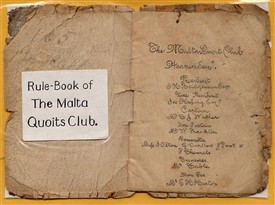
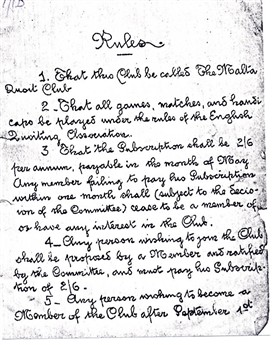
The editors re-discovered this article in a file of Ernie Ackroyd’s papers and photos which were donated to the Society many years ago, and had decided to publish it just before learning of the death of his son. Geoff, who died on 15 June 2017. Geoff wrote the rest of the Ackroyd story in The Village Baker, first published in 2011.
The move from Flamstead to Batford
On the family moving from Flamstead, where a baker’s business was already established, to Batford to “start the new Venture” in 1904:
My mother rather liked the change, and I think she felt that we children would be able to grow up in a better environment, and receive a better education. This, of course, was very true. Harpenden was that much more advanced, culturally. The schools were more advanced and the people were not so rurally isolated because of the building of the railway from London to Harpenden.
We found it very difficult to start with, as nobody, it seemed wanted to know us. It was very hard to get to know people and to make friends. But this has always been a well-known fact in Harpenden. You have to be here for quite a few years before you are accepted. I know it was very hard for Father to become accepted businesswise.
My mother soon got to work in the shop, stocking it with everything – groceries, poultry food, pig meal, seeds, bacon, hams and corned beef. She was a very capable woman, and somehow or other she always commanded respect, selling goods which people really needed.
There were two small factories close by, which helped our trade considerably. One was the Electrical Works run by a Mr Weekes [at Pickford Mill], who in later years moved to set up a large factory in Luton. His manager was a Mr Coombes. The other factory was Thomas Warwick Tyres, managed by a Mr Hughes, who invented a new substance for re-treading tyres. He patented the name of the Almagam. This caused quite a revolution in the tyre industry. Eventually the Electric Works was taken over, in addition making one substantial factory.
Newcomers to work at Almagam
Thomas Warwick was quite a rough diamond, a Cockney from the East End of London. He immediately started to recruit labour from the East End, people conversant with the rubber trade, and able to understand and talk his own language. He would think nothing of taking off his coat and having a set-to with any with whom he had had a row. All would soon be forgotten. Many of the old Batford families arrived in the area from London by being part of this early workforce. Some family names I call to mind are: Webb, Hucklesby, Raynor, Gay, Hickling, Hurst, Glenister, French, Sibley, Deamer, Austin, Smallwood and Shadbolt. Some arrived as lads and remained to work in the factory for the rest of their working lives. The Stoker was a Mr Simmons who lived with his wife, two sons and daughter in the house attached to the factory, besides which was a vegetable garden and orchard. The Caretakers were a Mr and Mrs Muir who grew wonderful produce in their garden which was sent to Mr Warwick’s town house in London. It was a very good spot for us boys to go apple scrumping!
The River Lea
It was then a very flourishing river, alive with fish – salmon, trout, roach, dace, gudgeon, pike, and loads of tiddlers, crayfish abounded and eels. The water was very clean, so of course we had plenty of bathing and boating, not that we ever bought a boat. We always seemed to get our own – some of which broke away from moorings further up the river and floated down at high water. We had several punts and a canoe. It was tremendously exciting for us. We used to make our crayfish nets out of barrel hoops and wire netting, reckoning to catch 12 dozen crayfish of an evening, then coming home to cook and eat them. I used to love this life. It was so easy to fish. There were shoals of roach, visible on the surface of the water. Also there were quite a lot of kingfishers, so beautiful and quick in flight. I am afraid we got into trouble with Mother as we were forever falling in the river, and you can understand the reception we had, coming into the home dripping with water.
Drainage
In 1906 there was no water laid on to the houses at Batford. The water used was mostly spring water which you had to pump, or well water. Many of the cottages had their own wells. Father had to install a pump and charcoal filter, enabling him to pump water from the river. The job of pumping water every night from the river, for Father to use to make the morning dough, was the task of the two oldest boys, my elder brother and me. The coal also had to be wheeled from the bottom of the yard, many barrow loads, for the furnaces. There was no play until these jobs were completed.
The Mills
At the end of Batford was the flour mill run by Mr Titmuss. He delivered by horse and cart, all manner of flour, poultry and pig food. One of the Shadbolts was his car man.
The Railway
The railway, of course, absorbed quite a lot of labour in those days, and most of the families in Coldharbour were either platelayers or navvies on the line: families such as the Deamers, Andrews, Oakley, Hawkes, and Perry, to name but a few. The two porters and shunters were Mr Lord and Mr Clements. It was a very busy line for cattle, coal, straw hats, coal, tyres and a frequent passenger service. There were the three signalmen, Messers Woodward, Chapman and Gammon. So you see, we were a very self-contained little village.
Some Batford Characters
The piece of ground opposite our shop, where three houses now stand, was a garden and it belonged to a very eccentric old man who owned quite a substantial amount of property bordering Church Green in Harpenden, where his wife lived. His name was Jack Bright and he made an old rough shack, under the elm tree. There he lived and cultivated the ground. My poor mother would take pity on him, by taking over hot soup, a hot dinner and a cup of tea to him. He was a thankless person, and seemed as if he did not wish to mix with anyone. Of course, he was a real target for us mischievous boys and we tormented him dreadfully. We would often bombard his hut with big clods of earth and he would come out and chase us. He lived there for years and finally died in his hut.
The Post Office was run by the Bingham family, who also ran a General Grocery store as well as the Blacksmith’s forge. They were a lovely family and often too kind. Many took advantage of this generosity by obtaining excess credit. This unfortunately forced the business to be sold in later years to another Harpenden grocer, Mr Bentley. The family were closely attached to Batford Chapel, especially Alice and Harry. Here they did much good amongst the local community.
The Bakery Business
Father, I think, was plodding along with the two businesses, although I think it must have been quite a headache. He was a plodder and he didn’t forget to keep us three eldest boys busy. Tiny ( the eldest) and myself had to get up at 6.30am, clean the stables out and feed the horse, then go into the bake house and have moulding lessons. At dinnertimes (having walked home from Victoria Road School) he always set us a chore. Tiny would have to get a basketful of bread and serve Salisbury Road, whilst I had to walk to Coldharbour Lane to serve four customers. This didn’t give us much time, as we left school at 12 o’clock and had to be back by 2 o’clock, allowing time to eat our dinner and walk back to school. On Saturdays Tiny had to go on the cart with Father and I had to start out at 8 o’clock to sell a basketful of cakes, walking up Station Road as far as Mr Buck’s shop, then back along Marquis Lane and over the meadows to Batford. The price of cakes in those days was ½ d each, 7 for 3d which consisted of doughnuts, buns, iced buns, rock cakes and turnovers. Father always did me up a basket worth of 5/6d. It was useless coming home until I had sold out. Sometimes it was heart-breaking, but I did it, and I think it instilled in me a certain fighting quality, never to give up, but keep on trying. Of course it was no good crying to Mother. We would have received no sympathy at all, as she supported Father 100%, as he did her. For the Shop we had to weigh up twice weekly, in bags, 1 hundredweight of sugar and cut up with a saw many blocks of salt for cooking purposes, there being no packets of salt in those days.
Watercress Growing
This was a very cold and hardworking job, managed by the Missenden family. The man in charge was Mr Wood, a great character. He had a large family, bringing them up very well, two of whom, Bow Wood and Hooky Wood, followed in his steps. He himself lived to the age of 92. The watercress beds stretched from the bottom of our garden as far as Gibralter Farm, The Folly at Wheathampstead. Besides watercress they used to grow Osiers for the making of baskets. The Osier beds were situated at Coldharbour and near the footbridge by Batford Meadows.
The Wheelwright
George Course who lived in the small cottages near the Railway Inn was the Wheelwright and Coach Builder. He was a real craftsman and could turn out beautiful carts and trolleys.
The Harness Maker
The Harness Maker worked in Harpenden at the bottom of Station Road. His name was J. Trustram, working with four assistants and doing a tremendous trade.
The Batford Pubs
At Batford there were two pubs, as there are today – “The Malta” and “The Gibralter”. “The Malta” was a very popular pub, the landlord being Mr McCable, brother to the livery stableman of St Albans who owned a large business for the hiring of cabs and horses for hunting. He also owned “The Peahen Hotel”. Its popularity was mainly due to the game of Quoits, encouraging the patronage of the pub by all classes of people. Horse -drawn coaches used to come from all around the district to play their League games. It was very interesting to watch. But at the end of the game it was a glorified booze up and there were consequently plenty of drunks about. “The Gibralter” was never so popular, although it also had a Quoits bed. I think the landlord was too mean and miserable.
Significant Memories
I remember Father getting up at 4o’clock one morning, rousing us boys and telling us to go and sit at the top of the fields (where Sir John Lawes School now stands) and watch for the aeroplanes to come over. This was the first race around England. We saw the first two come over, Colonel Cody and Graham White. It was terribly exciting and what funny old planes they were. A hundred must have come over that morning. Some unfortunately did not get very far.
The New King
King Edward had died of appendicitis and the whole country was in mourning. Father took us boys to London to see the guards on duty and Buckingham Palace. We were lucky enough to see the new king getting out of his carriage, and we thought this very wonderful. Every town and village was preparing for the celebrations and feasting. We must remember that this was a very great nation at this period and all the world looked up to England. We had a tremendous Empire, and as a child I was very proud to be British. Harpenden was getting underway with flags and bunting. We children at school had various jobs to do in the way of decoration. I went with other children to help light the fairy lights on the Common, which had chairs all around the Triangle on which the fairy lights were hung.
Excursions from Batford
Father always took us on any Tuesday to Brighton or Yarmouth on the excursion train, 5/- to Brighton and 6/- to Yarmouth. These trips were always well supported and we always looked forward to this. It was on this particular August Tuesday 1914 that we went to Brighton. On walking along the Front we saw the Proclamation of War posted up. This of course soon altered things in all walks of life. Men enlisted and women began to take their places, and things generally became more difficult.
Geoff Woodward’ article on Batford in the 1950’s and 1960s takes up many of these themes.

No Comments
Add a comment about this page